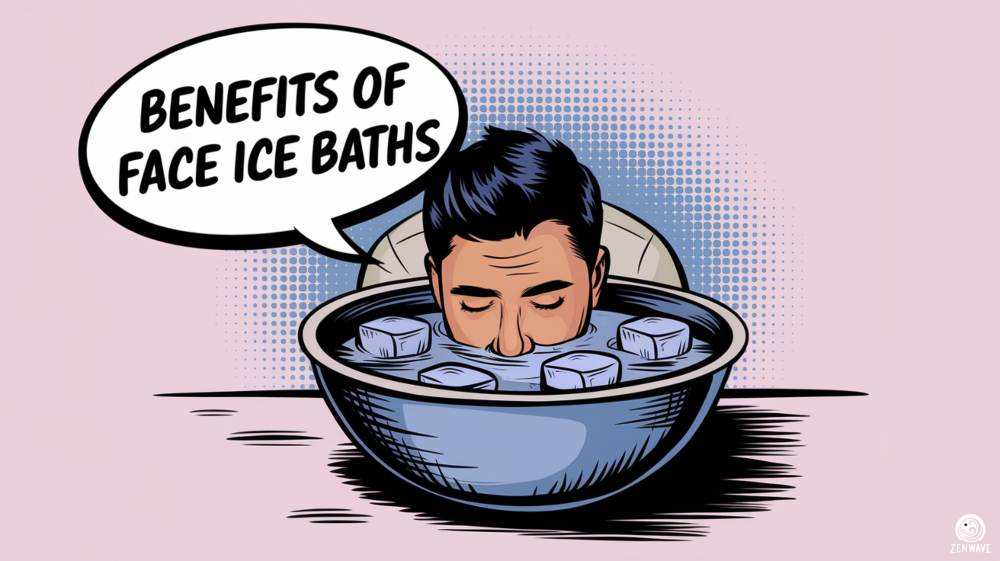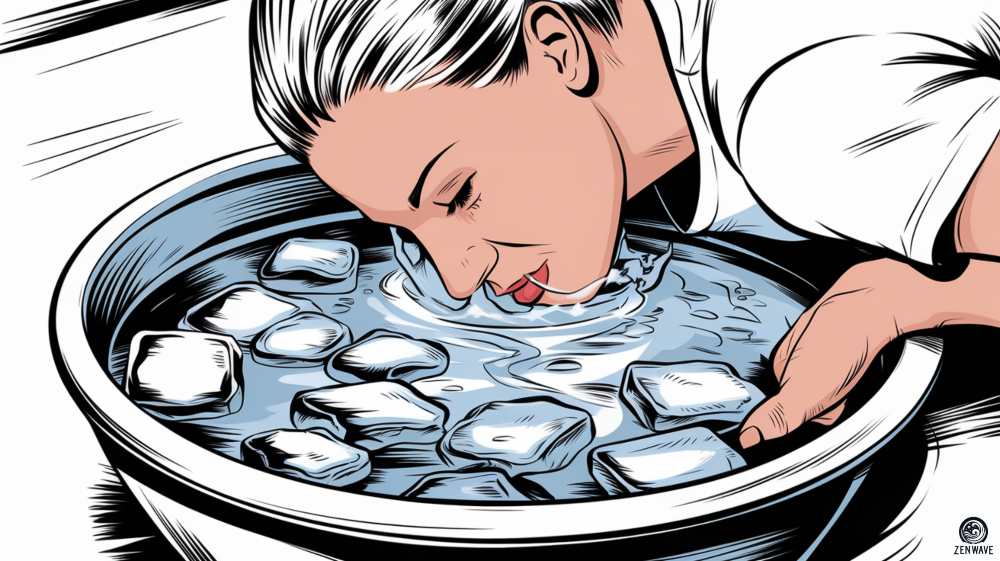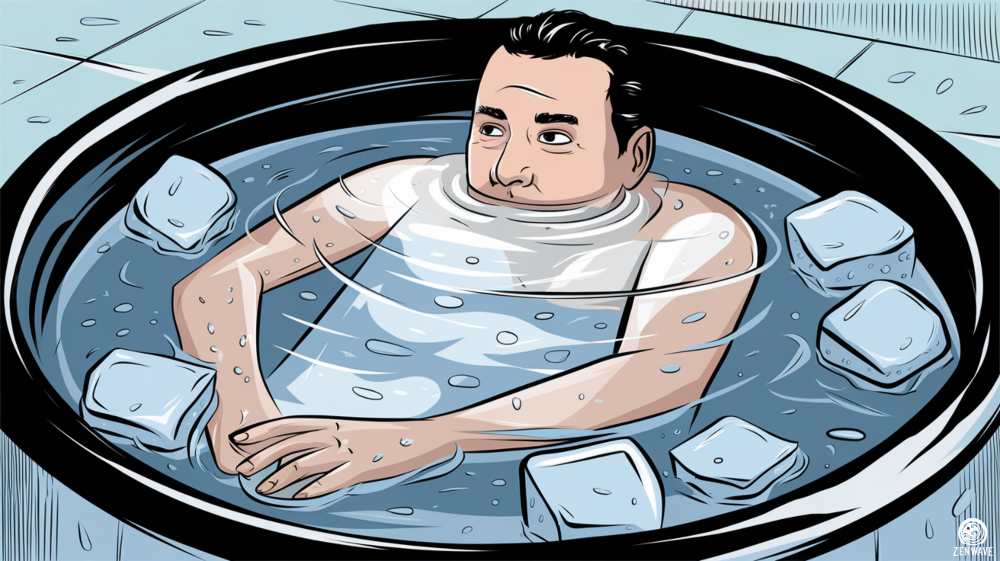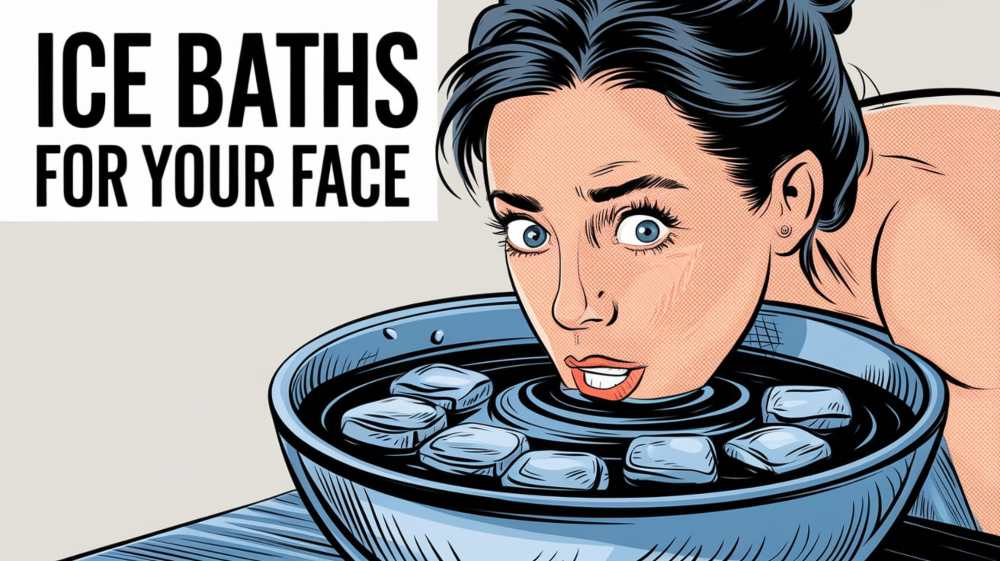Face ice baths, a simple yet powerful practice, offer a range of surprising benefits. From promoting faster recovery after exercise to reducing anxiety and panic, enhancing mental clarity, and even boosting stress tolerance, this technique harnesses your body’s natural responses to cold water. In just a matter of seconds, a face dip in cold water can trigger physiological changes that benefit both your body and mind.
Let’s explore how this very accessible practice works, and how it can be is done in or out of an actual ice bath.
Proven Benefits Of Face Ice Baths

1. Promotes Recovery After Exercise
In a study from 2010, scientists discovered that putting your face in cold water right after exercise is a simple and efficient way to help your body calm down quickly. They call this calming-down process “parasympathetic reactivation.”
To figure this out, researchers did a study with 13 men. In this study they had the men do a tough workout twice. After each workout, the men either: Sat quietly for 5 minutes, or put their face in cold water for 5 minutes. The scientists measured how fast their hearts slowed down and how steadily they beat after exercise. These measurements show how quickly the body calms down. The study showed that putting your face in cold water after exercise helps your body calm down faster.
When the men used the cold water face bath after exercise:
- Their heart rate slowed down more quickly
- Their heartbeats became more steady and relaxed
- Their parasympathetic reactivation was faster than those who didn’t
Faster parasympathetic reactivation due to a face dip in cold water :
- Faster Recovery: Your body starts to recover sooner, so you feel better more quickly.
- Less Stress on Your Heart: Your heart doesn’t have to work as hard after exercise.
2. Reduces Anxiety and Panic
In 2021 a study on cold water face immersion was done to see how it affected symptoms of panic.
Apart from its effects after exercise, research has found that putting your face in cold water can help reduce anxiety and panic in general.
Here’s what a study discovered:
- Lowered Heart Rate: People who put their face in cold water had a significant drop in their heart rate. A slower heart rate often means you’re feeling calmer.
- Less Anxiety: The people in the study reported feeling less anxious after using the cold water face immersion. They experienced fewer symptoms of anxiety.
- Reduced Panic: The cold water also seemed to help lessen feelings of panic in the participants.
This means that dunking your face in cold water might be a simple way to help you feel calmer and less anxious in general, not just after exercising. It’s like giving your body a quick signal to relax and take it easy.
When you are ready to get deeper into cold therapy, check out our guide on the mental benefits of ice baths for a deeper dive.
3. Increased Stress Tolerance

Face immersion in cold water, particularly during an ice bath, is a powerful way to build mental resilience. This practice goes beyond physical endurance, targeting your mind’s ability to cope with challenging situations. Here’s a deeper look at how it works:
- Controlled Discomfort: By voluntarily exposing yourself to the shock of cold water, you’re teaching your brain to remain calm in uncomfortable situations. This controlled stress can help you develop a more measured response to other stressors in life.
- Mindfulness Practice: The intense sensation of cold water on your face demands your full attention, naturally pulling you into the present moment. This forced mindfulness can help you learn to focus on the now, rather than worrying about future stresses.
- Hormonal Adaptation: Regular exposure to this type of stress can help regulate your body’s stress response over time. Your system may become more efficient at managing stress hormones like cortisol, potentially leading to a more balanced reaction to stressful events.
- Mental Toughness: Each time you complete a face immersion, you’re proving to yourself that you can overcome a difficult task. This builds confidence and mental toughness that can carry over into other areas of life.
- Emotional Regulation: Learning to stay calm when your body wants to panic is a valuable skill. This practice can improve your ability to regulate your emotions in high-pressure situations.
4. Enhanced Focus and Clarity
The effects of face immersion in cold water on mental clarity and focus are rooted in our body’s ancient survival mechanisms. The mammalian diving reflex triggers a cascade of physiological responses that can sharpen your mental state:
- Optimized Blood Flow: When your face hits cold water, your body instinctively redirects blood flow to your vital organs, including your brain. This ensures your most important organ gets a fresh supply of oxygen and nutrients.
- Heightened Alertness: The sudden cold shock activates your sympathetic nervous system, similar to the “fight or flight” response. This can make you feel more awake and alert almost instantly.
- Improved Cognitive Function: The increased blood flow to your brain can enhance various cognitive functions. You might notice: better information processing, better problem-solving abilities, and improved memory recall.
- Reduced Mental Fatigue: The refreshing effect of cold water can help clear mental fog, especially if you’re feeling tired or overwhelmed. It’s like a reset button for your brain.
- Increased Productivity: Many people report feeling more motivated and productive after cold water exposure. This could be due to the combination of increased alertness and the sense of accomplishment from overcoming the cold water challenge.
- Potential Long-term Benefits: Some researchers suggest that regular cold water exposure might have neuroprotective effects, potentially supporting long-term brain health.
Another thing to try compound these benefits before or after is different ice bath breathing techniques.
Face Ice Bath Protocol: Temperature and Time

For effective face dipping in cold water, aim for a temperature between 50 to 59°F (10 to 15°C). This chilly range is ideal for triggering your body’s natural diving reflex.
For duration, 10 to 30 seconds is typically enough to activate the reflex. If you’re new to this practice, start with just 10 to 15 seconds and gradually increase as you become more comfortable. It’s okay to repeat this a few times, but avoid overdoing it to prevent discomfort or shock.
The key is to stay calm and breathe steadily during the face dip. This helps activate your parasympathetic nervous system, promoting relaxation and stress reduction.
You can of course dip your face in a large bowl of clean ice water, but if you’re already experience benefits ice baths, you can easily add face dipping to your routine:
- While in your ice bath, take a few deep breaths to prepare.
- Lean forward and gently lower your face into the water.
- Keep your face submerged for 10 to 30 seconds, or as long as comfortable.
- Slowly lift your face out and resume normal breathing.
- Repeat a few times during your ice bath session if desired.
While face dipping is beneficial, submerging your entire head for extended periods is not recommended. Some people briefly go under at the beginning or end of an ice bath, but this should be done cautiously and only for very short durations.
Final Thoughts
Face ice baths are a remarkably simple yet effective tool for improving both physical and mental well-being. Whether you’re an athlete looking to enhance recovery, someone dealing with stress and anxiety, or just curious about boosting your mental clarity, this practice offers accessible benefits.
For those interested in exploring cold therapy further, our Zenwave Ice Pod provide a convenient way to try adding full-body cold exposure into your routine. When doing ice baths, start slowly, be consistent, and you may be surprised by the positive changes you experience from this refreshing practice.

